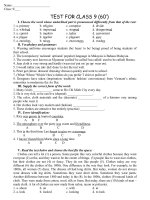Test unit 2
Bạn đang xem bản rút gọn của tài liệu. Xem và tải ngay bản đầy đủ của tài liệu tại đây (91.51 KB, 3 trang )
English 11C LE THANH BINH
UNIT 2
I. Chọn MỘT phương án cần phải sửa trong các phương án A, B, C và D trong các câu sau:(Thông Hiểu)
1. When he came, we were having a dinner.
A B C D
2. They speak English well because they practise speak it every day.
A B C D
3. We usually have English lesson twice a week.
A B C D
4. They never have breakfast before having bath.
A B C D
5. She likes her job but does not like wear uniforms.
A B C D
II. PHONETICS
Chọn từ có phần gạch chân có cách phát âm khác với ba từ còn lại:(Thông Hiểu)
6. A. show B. row C. mow D. cow
7. A. ask B. bad C. angry D. hat
8. A. like B. ninth C. determine D. kite
9. A. chore B. chemist C. chorus D. choir
10. A. wound B. group C. cousin D. through
III. VOCABULARY AND STRUCTURE:
Học sinh chọn phương án trả lời đúng nhất trong các phương án A hoặc B, C, D.(Nhận biết)
11. He ordered a bottle of beer and some cheese __________ up to his room.
A. send B. sent C. to send D. sending
12. She entered, _____________ by her father.
A. accompanied B. accompanying C. had accompanied D. to accompany
13. We want our children well ____________.
A. educated B. educate C. to educate D. educating
14. I've watched you _________ for many years, since you were a little baby.
A. grown B. growing C. to grow D. grow
15. Through the car window I saw Tom and Helen __________ together.
A. walk B. to walk C. walked D. walking
16. I'd like to __________ a complaint about the noise.
A. have B. make C. offer D. do
17. Not __________ the language and __________ no friends in the country, he found it impossible to get a job.
A. know/ have B. known/ having C. knowing/ having D. to know/ to have
18. I have a great _________ for New York.
A. affect B. affection C. effect D. affected
19. I prefer __________ neutral than ________ sides.
A. be/ take B. be/ taking C. to be/ to take D. being/ taking
English 11C LE THANH BINH
20. Pasteur ___________ in the 19th century.
A. was living B. has lived C. had lived D. lived
21. They found her ___________ on the lawn, enjoying the sunshine.
A. lie B. lying C. to lie D. lay
22. By having your car __________ regularly, you will be safe on the road.
A. check B. checking C. to check D. checked
23. My boss is angry with me. I didn't do all the work that I __________ last week.
A. should do B. must have done C. should have done D. would have done
24. I felt the house ____________.
A. shaking B. shake C. shaken D. to shake
25. Dogs are good _________ smelling in order to search _______ something.
A. at/ at B. at/ for C. for/ at D. for/ for
26. Her remark was followed by an __________ silence.
A. embarrassed B. embarrass C. embarrassment D. embarrassing
27. I think I can smell something ____________.
A. burn B. burnt C. to burn D. burning
28. I said I had not heard the matter ___________.
A. mention B. mentioned C. mentioning D. to mention
29. ____________ to rain before you woke up this morning?
A. Had it begun B. Has it begun C. Did it begin D. Will it begin
30. Mary: "Where's my hat?" Tom: "Oh, you __________ on the bench.
A. should have left B. should leave C. would have left D. must have left
IV. READING COMPREHENSION:
Đọc kĩ đoạn văn sau, chọn phương án trả lời đúng nhất A hoặc B, C, D cho các câu hỏi sau.(Vận dụng)
Hatred is a fundamental human emotion that that deep roots in society and culture. Psychologists believe that
group identity and cohesion depend to a large extent on having common enemy. It seems that the existence of
"bad guys" is an important element in defining who we are within a larger realm. It could be said that human
beings love to hate.
The first signs appear early in life when a child, faced with blame for someone mistake, immediately accuses
another child or an inanimate object such as a teddy bear. Later, on the schoolyard playground, children in rival
groups vie for attention and influence. These basic responses translate into more powerful emotions later in life.
One area where deep-rooted hatred is exhibited is in the ethnic clashes that constantly occur around the globe.
These conflicts are not only over territory but also involve emotional issues of group identity and unity of
purpose. For many, there is no "us" without a "them" to hate. In a world where conflict between superpowers is on
the decline, it may be that humanity will have difficulty adapting to a state of mutual respect and cooperation.
31. According to the passage, what is believed to be an important aspect of defining group identity?
A. Facing a common enemy. B. accepting blame for past actions.
C. Ignoring a larger realm D. Being reluctant to hate.
32. In paragraph 2, the word "vie" could be best replaced by which of the following?
A. manipulate B. defend C. compete D. cooperate
33. The author suggests that when children make mistake they
A. need emotional support from personal objects like teddy bears.
B. join rival gangs on schoolyard playgrounds.
C. rarely accept responsibility for their actions.
D. readily admit to their errors.
34. Which of the following is the best title for the passage?
A. Roots of Society B. Group Unity C. Social and cultural problems D. Basic Emotion
35. According to the passage, early childhood responses to blame
A. are not related to stronger feeling in adulthood.
English 11C LE THANH BINH
B. demonstrate how human beings love to hate.
C. are not well understood by psychologists.
D. are complex expressions of emotion.
V. Chọn MỘT phương án A, B, C hoặc D để xây dựng một câu có nghĩa dựa trên những từ/ cụm
từ gợi ý.(Vận dụng)
36. They never made us do anything we didn't want to do.
A. we have never made to do anything we didn't want to do.
B. we had never made to do anything we didn't want to do.
C. we are never made to do anything we didn't want to do.
D. we were never made to do anything we didn't want to do.
37. Peter has not had his haircut for over 4 months.
A. It's over 4 months since Peter has had his haircut.
B. It's over 4 months since Peter had his haircut.
C. It's over 4 months since Peter has his haircut.
D. It's over 4 months since Peter had had his haircut.
38. "Why don't you put a better lock on the door, Mary?" Jane asked.
A. Jane suggested that Mary may put a better lock on the door.
B. Jane suggested that Mary must put a better lock on the door.
C. Jane suggested that Mary might put a better lock on the door.
D. Jane suggested that Mary should put a better lock on the door.
39. He had hardly left the office when the phone rang.
A. No sooner did he leave the office than the phone rang.
B. No sooner he had left the office when the phone rang.
C. No sooner he had left the office than the phone rang.
D. No sooner had he left the office than the phone rang.
40. The water was so cold that the children could not swim in it.
A. The water was not warm enough for the children to swim in.
B. The water was not warm enough for the children swim in.
C. The water was not warm enough for the children to swim in it.
D. The water was not enough warm for the children to swim in.

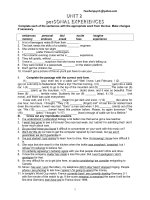
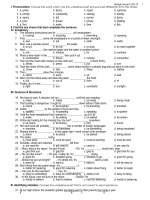

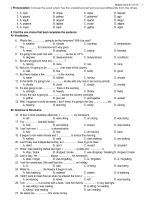
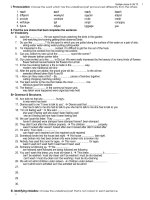
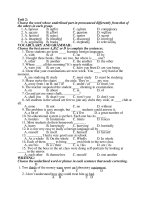
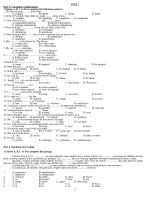
![test unit 6 [2]](https://media.store123doc.com/images/document/13/pt/yz/medium_yzq1372518559.jpg)
